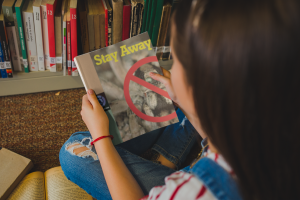 I recently received this email:
I recently received this email:Hello, I am writing on behalf of my 5-year-old son, Oliver, who LOVES the book Stay Away! by Jenny Feely.
We live in England. Oliver is in Reception and has enjoyed learning to read. Stay Away! was one of the first books that he selected to bring home from school. Typically, the children are to return the book each day and select a new one, but Oliver loves this book so much he brings it back every day!
This message made my day. Here was an example of a child who was fully engaged in reading. He’d found a book he loved and he was treasuring it. And I’d been part of it. For any author, this is the writing prize: a reader who responds at a deep level to the work and who is engaged.
As a writer of early literacy resources, such a response is important to me. Whenever I put pen to paper or fingers to keyboard, I strive to write books that will be both engaging and supportive. It creates challenges that picture storybook writers do not have to contend with. But I have the same aim as those revered writers. I want to provide a reading experience that makes my readers want to keep turning the page. One that makes them laugh or gasp or widen their eyes as they say “I didn’t know that.” It’s hard to do.
As a teacher I want children to read widely, to develop and hone their comprehension, to broaden their vocabulary and most importantly to see reading as a purposeful and valuable skill. Oliver seems to be doing this.
But it made me think of how the “rules” of home reading programs can get in the way of nurturing young readers. “You took that book home yesterday/last week/last month. Choose something else. You can’t read the same book every night. That book was fine last week, but now you need to move onto books in the ‘yellow’ box.” Don’t get me wrong, no one, especially me, wants any reader to only read one book, but it is also important to respond positively to any signs that a student is loving reading. Perhaps offering two books.
Honoring the reader’s choice.
Oliver’s Mum understood this. Her email went on to to say:
As he brings it (Stay Away!) back every day the other children do not get the opportunity to fall in love with it too, so I would like to buy him his own copy (I am also very worried that come the end of the school year Oliver will be devastated when he has to hand it back!) Please will you let me know if I could arrange to purchase a copy?
Isn’t that what reading is all about? Don’t we all have favorite books that we cannot part with? Books we have read over and over and will read again in the future? Books that have been so well-loved that they are falling apart? And when we come across students like Oliver can’t we find a way to value their choices too?

